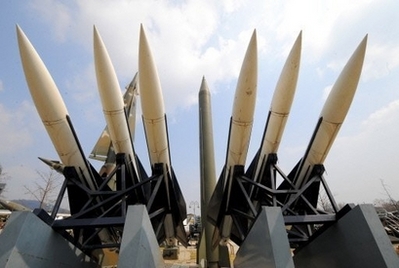
Obama Embraces Missile Defense in Nuclear Posture Review
Josh Rogin
The document claims that missile defense is critical to allowing the United States to shift away from nuclear weapons, especially now that the U.S. will no longer threaten to use nukes to retaliate against non-nuclear attacks, such as from chemical or biological weapons.

The review even features a photo of a missile being shot from an Aegis destroyer in 2007, in what many outside experts saw at the time as a clear demonstration of the fact that U.S. missile defense capabilities can also have offensive uses as well, such as shooting down a satellite.
"Major improvements in missile defenses and counter-weapons of mass destruction (WMD) capabilities have strengthened deterrence and defense against CBW attack," reads the document, known as the Nuclear Posture Review, which will stand as the Obama administration's guiding document on all things nuclear.
"With the advent of U.S. conventional military preeminence and continued improvements in U.S. missile defenses and capabilities to counter and mitigate the effects of [chemical and biological weapons], the role of U.S. nuclear weapons in deterring non-nuclear attacks -- conventional, biological, or chemical -- has declined significantly," the document claims.
Later on in the document, the administration points to Russia and China's nuclear modernization and notes that both countries view U.S. missile-defense expansion as destabilizing. Secretary Clinton addressed that issue in Tuesday's press conference.
The NPR itself was careful to mention missile defense as only one of several capabilities needed to counter non-nuclear attacks.
But Secretary Clinton was less careful.
"It's no secret that countries around the world remained concerned about our missile-defense program," Clinton said, explaining that the NPR weighs in on "the role [missile defense] can and should play in deterring proliferation and nuclear terrorism."
Ok, so now missile defense can deter chemical attacks, biological attacks, proliferation of nuclear technology, and suitcase bombs?
Regardless, the document makes clear that with fewer nukes to be deployed once the new START agreement goes into effect, and with the role of nuclear weapons now limited to responding to nuclear threats, the administration is now looking to missile defense, among other technologies, to fill in the gap.
"As the role of nuclear weapons is reduced in U.S. national security strategy, these non-nuclear elements will take on a greater share of the deterrence burden," the review reads.
Outside experts doubted that the NPR's suggested shift toward a reliance on missile defense would provide any deterrence for most types of chemical and biological attacks or the use of a nuclear device by a terrorist.
"If they deliver them by missile, fine, but that's not likely to be the case," said Peter Huessy, president of Geostrategic Analysis, a defense consulting firm. "If our biggest threat is terrorists using nukes, then of course deterrence doesn't apply and missile defense doesn't apply either."
Huessy also commented on Obama's embrace of missile defense in the NPR, which seems out of line with the criticism he leveled when running for president in 2008.
"I certainly see a pivot in the sense of what people expected," he said. "Missile defense is now front and center in America's security policy. That's' certainly a shift from Obama's campaign rhetoric."
www.globalresearch.ca/index.php
April 7, 2010
